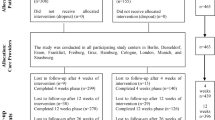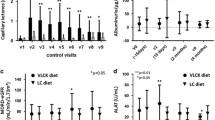Abstract
To investigate safety, compliance, and efficacy, on weight loss and cardiovascular risk factors of a multiphasic dietary intervention based on meal replacements, including a period of very low calorie diet (VLCD) in a population of obese patients. Anthropometric parameters, blood tests (including insulin), dual-energy-X-ray absorptiometry (DXA), and questionnaires for the assessment of safety and compliance before and after (phase I) a 30-day VLCD, 700 kcal/day, normoproteic, 50 g/day carbohydrate, four meal replacements; (phase II) a 30-day low calorie diet (LCD), 820 kcal/day, three meal replacements plus a protein plate; (phase III) 60-day LCD, 1,100 kcal/day, two meal replacements plus two protein plates and reintroduction of small amounts of carbohydrates; (phase IV) 60-day hypocaloric balanced diet (HBD), 1,200 kcal/day, one meal replacement, two protein plates and the reintroduction of carbohydrates. 24 patients (17 females, 7 males, mean BMI 33.8 ± 3.2 kg/m2, mean age 35.1 ± 10.2 years) completed the study. The average weight loss was 15.4 ± 6.7 %, with a significant reduction of fat mass (from 32.8 ± 4.7 to 26.1 ± 6.3 % p < 0.05) and a relative increase of lean mass (from 61.9 ± 4.8 to 67.1 ± 5.9 % p < 0.05). An improvement of metabolic parameters and no variations of the liver and kidney functions were found. A high safety profile and an excellent dietary compliance were seen. The VLCD dietary program and the replacement dietary system described here is an effective, safe, and well-tolerated treatment for weight control.



Similar content being viewed by others
References
D.W. Haslam, W.P. James, Obes. Lancet. 366, 1197–1209 (2005)
V.I. Kraak, B. Swinburn, M. Lawrence, P. Harrison, An accountability framework to promote healthy food environments. Public Health Nutr. 25, 1–17 (2014)
L.M. Donini, M. Cuzzolaro, L. Gnessi, C. Lubrano, S. Migliaccio, A. Aversa et al., Obesity treatment: results after 4 years of a Nutritional and Psycho-Physical Rehabilitation Program in an outpatient setting. Eat Weight Disord. 1 Mar (2014)
S. Desroches, A. Lapointe, S. Ratté, K. Gravel, F. Légaré, S. Turcotte, Interventions to enhance adherence to dietary advice for preventing and managing chronic diseases in adults. Cochrane Database Syst. Rev. 2, CD008722 (2013). doi:10.1002/14651858
M.J. Munsters, W.H. Saris, Body weight regulation and obesity: dietary strategies to improve the metabolic profile. Annu. Rev. Food Sci. Technol. 5, 39–51 (2014)
S. Melotto, Clinical pharmacology of eating and not eating. Curr. Opin. Pharmacol. 14C, 1–5 (2014)
N. Vogels, P. Westerterp, Successful long-term weight maintenance: a 2-year follow-up. Obesity (Silver Spring) 15, 1258–1266 (2007)
C. Rolland, K.L. Johnston, S. Lula, I. Macdonald, J. Broom, Long-term weight loss maintenance and management following a VLCD: a 3-year outcome. Int. J. Clin. Pract. 68, 379–387 (2014)
S. Ramage, A. Farmer, K. Apps Eccles, L. McCargar, Healthy strategies for successful weight loss and weight maintenance: a systematic review. Appl. Physiol. Nutr. Metab. 39, 1–20 (2014)
R.U. Pliquett, D. Fuhrer, The effect of insulin on the central nervous system-focus on appetite regulation. Horm. Metab. Res. 38, 442–446 (2006)
D. Weigle, P. Breen, C. Matthys, A high protein diet induces sustained reductions in appetite, ad libitum caloric intake, and body weight despite compensatory changes in diurnal plasma leptin and ghrelin concentrations. Am. J. Clin. Nutr. 82, 41–48 (2005)
R. Vettor, R. Fabris, Neuroendocrine regulation of eating behavior. J. Endocrinol. Investig. 25, 836–854 (2002)
P. Björntorp, Obes. Lancet 350, 423–426 (1997)
S. Rössner, J.S. Torgerson, VLCD a safe and simple treatment of obesity. Lakartidningen 97, 3876–3879 (2000)
W.Y. Lin, C.H. Wu, N.F. Chu, Efficacy and safety of very-low-calorie diet in Taiwanese: a multicenter randomized, controlled trial. Nutrition 25, 1129–1136 (2009)
P. Dhindsa, A.R. Scott, R. Donnelly, Metabolic and cardiovascular effects of very-low-calorie-diet therapy in obese patients with type 2 diabetes in secondary failure: outcome after 1 year. Diabet. Med. 20, 319–324 (2003)
G.F. Cahill Jr, R.L. Veech, Ketoacidosis? Good medicine? Trans. Am. Clin. Climatol. Assoc. 114, 149–161 (2003)
K. Casazza, K.R. Fontaine, A. Astrup, L.L. Birch, A.W. Brown, M.M. Bohan Brown et al., Myths, presumptions, and facts about obesity. N. Engl. J. Med. 368, 446–454 (2013)
K.R. Ryttig, H. Flaten, S. Rössner, Long-term effects of a very low calorie diet (Nutrilett) in obesity treatment. A prospective, randomized, comparison between VLCD and a hypocaloric diet + behavior modification and their combination. Int. J. Obes. Relat. Metab. Disord. 21, 574–579 (1997)
J.L. Childs, M.D. Yates, M.A. Drake, Sensory properties of meal replacement bars and beverages made from whey and soy proteins. J. Food Sci. 72, S425–S434 (2007)
S. Sette, C. Le Donne, R. Piccinelli, L. Mistura, M. Ferrari, C. Leclercq, INRAN-SCAI 2005–06 study group. The third National Food Consumption Survey, INRAN-SCAI 2005–06: major dietary sources of nutrients in Italy. Int J Food Sci Nutr. 64, 1014–1021 (2013)
D. Machin, M.J. Campbell, S.B. Tan, S.H. Tan, Sample Size Tables for Clinical Studies, 3rd edn. (Wiley-Blackwell, Oxford, 2009)
P. Sumithran, L.A. Prendergast, E. Delbridge, Ketosis and appetite-mediating nutrients and hormones after weight loss. Eur. J. Clin. Nutr. 67, 1–6 (2013)
Y. Gu, A. Zhao, F. Huang, Y. Zhang, J. Liu, C. Wang et al., Very low carbohydrate diet significantly alters the serum metabolic profiles in obese subjects. J. Proteome Res. 12, 5801–5811 (2013)
M. Hession, C. Rolland, U. Kulkarni, A. Wise, J. Broom, Systematic review of randomized controlled trials of low-carbohydrate vs. low-fat/low-calorie diets in the management of obesity and its comorbidities. Obes. Rev. 10, 36–50 (2009)
A. Paoli, A. Rubini, J.S. Volek, K.A. Grimaldi, Beyond weight loss: a review of the therapeutic uses of very-low-carbohydrate (ketogenic) diets. Eur. J. Clin. Nutr. 67, 789–796 (2013)
K. Esposito, P. Chiodini, MI. Maiorino, G. Bellastella, D. Panagiotakos, D. Giugliano. Which diet for prevention of type 2 diabetes? A meta-analysis of prospective studies. Endocrine 18, (2014). doi:10.1007/s12020-014-0264-4
L. Velázquez-López, E. González-Figueroa, P. Medina-Bravo, I. Pineda-Del Aguila, L. Avila-Jiménez, R. Ramos-Hernández et al., Low calorie and carbohydrate diet: to improve the cardiovascular risk indicators in overweight or obese adults with prediabetes. Endocrine 43, 593–602 (2013)
N.B. Bueno, I.S. Vieira, S. Lima, T. Rocha, Very-low-carbohydrate ketogenic diet v. low-fat diet for long-term weight loss: a meta-analysis of randomised controlled trials. Br. J. Nutr. 110, 1178–1187 (2013)
C.B. Ebbeling, J.F. Swain, H.A. Feldman, W.W. Wong, D.L. Hachey, E. Garcia-Lago et al., Effects of dietary composition on energy expenditure during weight-loss maintenance. JAMA 307, 2627–2634 (2012)
S.G. Camps, S.P. Verhoef, K.R. Westerterp, Weight loss, weight maintenance, and adaptive thermogenesis. Am. J. Clin. Nutr. 97, 990–994 (2013)
B. Moreno, D. Bellido, I. Sajoux, A. Goday, D. Saavedra, A.B. Crujeiras, F.F. Casanueva, Comparison of a very low-calorie-ketogenic diet with a standard low-calorie diet in the treatment of obesity. Endocrine (2014). doi:10.1007/s12020-014-0192-3
Conflict of interest
The authors declare that they have no conflict of interest.
Author information
Authors and Affiliations
Corresponding author
Rights and permissions
About this article
Cite this article
Basciani, S., Costantini, D., Contini, S. et al. Safety and efficacy of a multiphase dietetic protocol with meal replacements including a step with very low calorie diet. Endocrine 48, 863–870 (2015). https://doi.org/10.1007/s12020-014-0355-2
Received:
Accepted:
Published:
Issue Date:
DOI: https://doi.org/10.1007/s12020-014-0355-2




